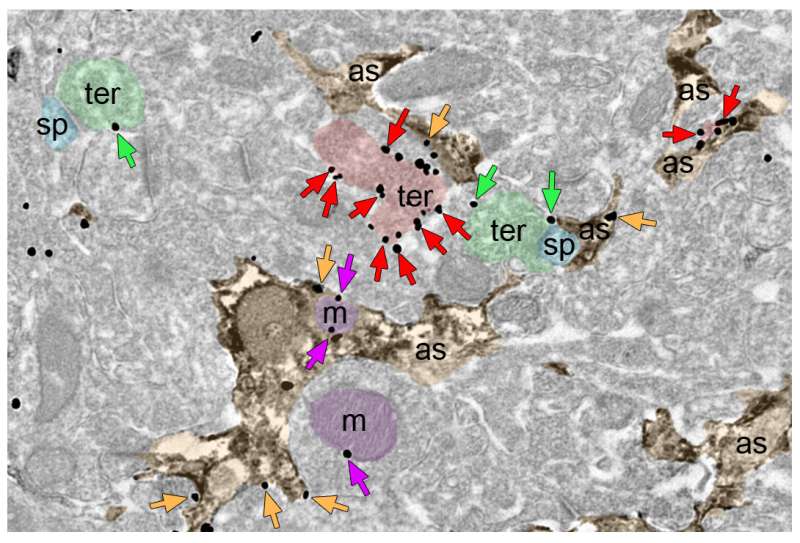Cannabinoids decrease the metabolism of glucose in the brain

The nervous system comprises neurons and glial cells (glia means 'glue'). Astrocytes are the most abundant among the glial cells. Among many other functions they undertake to capture glucose from the blood stream to provide energy and allow the necessary neuronal activity to take place, and thus ensure that cognitive functions are performed correctly. Neurons for their part control astrocyte activity by means of molecules present in the astrocytes, which include type 1 (CB1) cannabinoid receptors. However, these receptors, which also modulate communication between the astrocytes and the neurons, constitute the main target of the psychoactive component of cannabis, known as THC (delta-9-tetrahydrocannabinol).
What happens when THC acts on the astrocytes? The research, in which Dr. Pedro Grandes' group participated, concludes that the activation of CB1 cannabinoid receptors in the mitochondria (cell organelles responsible for producing energy) of mice astrocytes hampers the metabolism of glucose and the production of lactate in the brain; this alters neuronal function and leads to a deterioration in social interaction behaviors. Specifically, according to Dr. Grandes, "The activation of these receptors causes the astrocytes to generate fewer reactive oxygen species, which has a negative effect on glucose production from lactate leading to neuronal stress and a lack of social interaction. What makes this research significant is not only the identification of this deficiency, which can be reversed through genetic and pharmacological manipulation of these molecular and biochemical changes brought about by cannabinoid treatment, but also its contribution to knowledge relating to the changes caused by cannabis in the brain."
The following people have participated in this study: Nagore Puente and Itziar Bonilla, Svein Achicallende and Pedro Grandes of the Department of Neurosciences of the Faculty of Medicine and Nursing at the UPV/EHU-University of the Basque Country and from the Achucarro Basque Center for Neuroscience; they worked alongside an international multidisciplinary team led by the researchers Juan P. Bolaños (University of Salamanca) and Giovanni Marsicano (NeuroCentre Magendie de Bordeaux, University of Bordeaux) with researchers from the Complutense University of Madrid, University of Poitiers and University Paris-Saclay (France), Université de Moncton and University of Victoria (Canada), University of Lausanne (Switzerland) and the University Medical Center, Mainz (Germany), among other centers and hospitals.
The collaboration between Dr. Pedro Grandes' research group and the team led by Dr. Giovanni Marsicano of the University of Bordeaux turned out to be crucial in demonstrating, for the first time, the presence of CB1 receptors in neuron mitochondria, whose activation reduces mitochondrial activity leading to memory loss. The results of these studies were published in 2012 in Nature Neuroscience and in 2016 in Nature. However, "What remains to be done is to find out the function of the CB1 receptors located in the astrocyte mitochondria, and therein lies the significance of this new finding, which also constitutes continuity in the cross-border line of research and co-operation," explained Dr. Grandes.
More information: Daniel Jimenez-Blasco et al, Glucose metabolism links astroglial mitochondria to cannabinoid effects, Nature (2020). DOI: 10.1038/s41586-020-2470-y





















